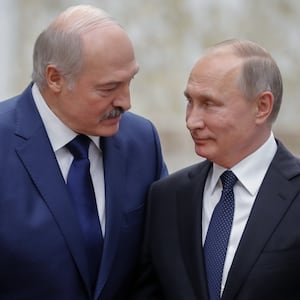For years, there have been whispers that the Russian government holds compromising materials on Donald Trump. Now, The Guardian claims to have its hands on an alleged leak from the heart of the Kremlin that shows them boasting about “kompromat.”
The supposed leak obtained by The Guardian reportedly claims that President Vladimir Putin personally approved a nefarious plan to throw Russia’s support behind Trump’s 2016 campaign. The document states that Putin, his spy chiefs, and top ministers agreed that a victory for a “mentally unstable” Trump would permanently weaken the United States.
The document also reportedly states that the Kremlin has so-called kompromat—or damaging intelligence—on Trump. It cryptically refers to “certain events” that happened during “non-official visits to Russian Federation territory.” The purported leak doesn’t explain what those events involved—only referring to an appendix that wasn’t attached to the obtained document.
The Daily Beast has not reviewed the supposed Kremlin leak, and The Guardian has not definitively proven it to be authentic. Questions about its veracity were raised almost immediately after its release, with some Russian Twitter users highlighting linguistic errors in the document, and words not used by native Russian speakers.
The Washington Post’s national correspondent Philip Bump wrote that it’s “hard not to be skeptical of the document.” For example, some of the phrases used, like describing Trump as “mentally unstable,” seem a little too titillating, and some of the predictions of a Trump victory leading to destabilization seem a little too prescient for a 2016 memo.
The document is suspiciously light on actual evidence of kompromat, and it includes a discussion of potential social media influence campaigns that were already well underway, he wrote.
Bump also points out that the lead Guardian reporter on Thursday’s story had a 2018 scoop about Trump’s former campaign manager, Paul Manafort, going to London to meet with Julian Assange shortly before WikiLeaks released Democratic emails hacked by Russia—but Robert Mueller’s report never corroborated it, nor did other reporters.
Putin’s spokesman Dmitri Peskov called the supposed leaked papers “a great pulp fiction” and Trump called the story “disgusting” and “fake news” in a statement to the Daily Mail.
Other media allegations based on intelligence reports have also ultimately proven to be wrong but, in its Thursday report, The Guardian has quoted experts on Russian spy agencies and Kremlin diplomacy who say they have no reason to doubt that the document is genuine.
Trump is known to have visited Moscow on multiple occasions in the decades before he was elected in 2016. One memorable section of the Steele dossier threw up some extraordinary but unsubstantiated claims about the former president and some Russian prostitutes in a Moscow hotel room when he jetted to Russia for the 2013 Miss Universe pageant.
The document reportedly offers more detail on what Kremlin leaders allegedly thought of Trump before he became president and why they wanted him to win. It reportedly describes the future president as an “impulsive, mentally unstable and unbalanced individual who suffers from an inferiority complex,” and, therefore, the “most promising candidate.”
The Guardian reports that the document states that a Kremlin plan to back Trump was agreed upon at a meeting of the national security council on Jan. 22, 2016. The document reportedly recommends that the Kremlin and its spy agencies use “all possible force” to push Trump to victory in the election and help him sow “social turmoil” in the United States.
The document reportedly predicts that a Trump win “will definitely lead to the destabilization of the U.S.’s sociopolitical system,” and a “social explosion.” The papers threaten to insert “media viruses” into American systems to help exacerbate the chaos of a Trump presidency.
Trump has historically denied that Russia helped elect him as president and that the Kremlin has any kompromat on him.
Months after the January 2016 meeting, Russian hackers broke into the servers of the Democratic National Committee and released thousands of private emails in an attempt to damage Hillary Clinton’s campaign.






